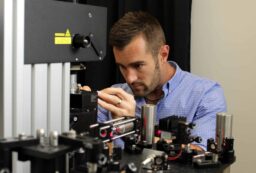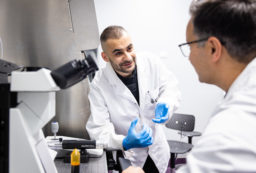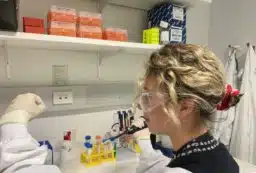Pure clean water
A young Sydney researcher and surfer is using laser technology to revolutionise the detection of dangerous bugs like cryptosporidium in water.
Young Australian researcher Mark Gauci is using laser technology to detect dangerous micro-organisms that closed public swimming pools across the eastern seaboard this year.
The techniques were used to identify recent outbreaks of Cryptosporidium and Giardia in Sydney, Brisbane and Canberra in February and March, and are now receiving international recognition.
Mark has been in Germany this week (May 5-6) representing Australian water researchers at a high-level workshop in Karlsruhe. At 26, he was nominated by his university – Macquarie University in Sydney – to present the results of his group’s pioneering work in water-quality testing. The workshop is sponsored by the Federal Department of Industry, Science and Tourism.
“Water quality is the major issue for water utilities in developed countries. Micro-organisms such as Cryptosporidium and Giardia are amongst the best known public health enemies. The diagnostic kits developed by Macquarie quickly help to identify the sources of contamination,” said Mark.
An optoelectronics graduate, Mark helps to create more sophisticated instrumentation to test water samples – from swimming pools, rivers or city drinking supplies. Using commercial laser flow cytometers with sophisticated add-ons, the scientists can then detect a range of disease-producing particles in samples, tagging the organisms so that they fluoresce distinctively when passed through a laser beam.
Worldwide patents are being sought for two of Mark’s problem-solving designs and an international scientific company has already bought a financial interest.
Mark laughingly attributes his practical engineering skills to playing with Lego as a child.
Now studying for a masters degree, his research crosses several disciplines – laser physics, microbiology and ecology. As well as the water research he is using his flow cytometry expertise to automatically identify and count the small organisms that live in soil. Until now, researchers had to view soil samples under the microscope and tediously count organisms such as soil mites.
But it is Mark’s work as a research engineer with the Australian Environmental Flow Cytometry Group at Macquarie that is creating the scientific excitement. Group head, microbiologist Dr Duncan Veal, says that Mark’s background in laser physics is helping to accelerate the findings of experienced microbiologists.
“A very basic example would be a problem we had last year with our instrumentation. We wanted the flow cytometer to see or recognise only the particles we were interested in. Traditionally we would have twiddled the knobs until we achieved better separation. Mark made a mathematical model of the problem and within weeks had resolved it.”
So successful has the group been that their annual industry and government partnerships now totals millions of dollars. Macquarie is recognised a world leader in water quality research and the collaboration with commercial companies has seen a happy marriage of pure and applied science.
While the original research focused on water quality in Sydney, the technology is proving generic. Several companies and corporations are now exploring possible implications for other major Aussie concerns – the purity of our milk, wine, beer and meat.
Young Australian researcher Mark Gauci is using laser technology to detect dangerous micro-organisms that closed public swimming pools across the eastern seaboard this year.
The techniques were used to identify recent outbreaks of Cryptosporidium and Giardia in Sydney, Brisbane and Canberra in February and March, and are now receiving international recognition.
An optoelectronics graduate, Mark is helping to create more sophisticated instrumentation to find micro-organisms in water samples – from swimming pools, rivers or city drinking supplies. Using commercial laser flow cytometers with sophisticated add-ons, the scientists are now able to detect a range of disease-producing particles in samples, tagging the organisms so that they fluoresce distinctively when passed through a laser beam.
This week (May 5-6) Mark Gauci is representing Australian water researchers at a high-level workshop in Karlsruhe, Germany. At 26 Mark was nominated by his university – Macquarie University in Sydney – to present the results of pioneering work in water-quality testing.
“Cryptosporidium and Giardia are amongst the primary public health concerns of water utilities in developed countries. Outbreaks traced back to swimming pools earlier this year created wide-spread community anxiety,” he said.
Worldwide patents are being sought for two of Mark’s problem-solving creations. The instruments have been modified to selectively capture pathogens for microscopic examination and allow greater accuracy. An international medical company has already expressed a financial interest in one of these new accessories.
Even more excitingly, the technology developed over the past decade by Macquarie researchers is proving generic rather than specific.
What began as pioneering research into water quality in Sydney may now have implications for other major Aussie concerns – the purity of our milk, wine, beer and meat.
But the original water focus is highly appropriate for Mark. Growing up in Coffs Harbour, he was an avid surfer and yachtsman. He won a BHP Transport scholarship to become a trainee deck officer after high school and sailed in international waters. A change of tack, however, saw him enroll at university and eventually see water in a very different light.
“Science is hard work. The highs are high, the lows low, but the highs make it all worthwhile,” said Mark.





 Fresh Science is on hold for 2022. We will be back in 2023.
Fresh Science is on hold for 2022. We will be back in 2023.